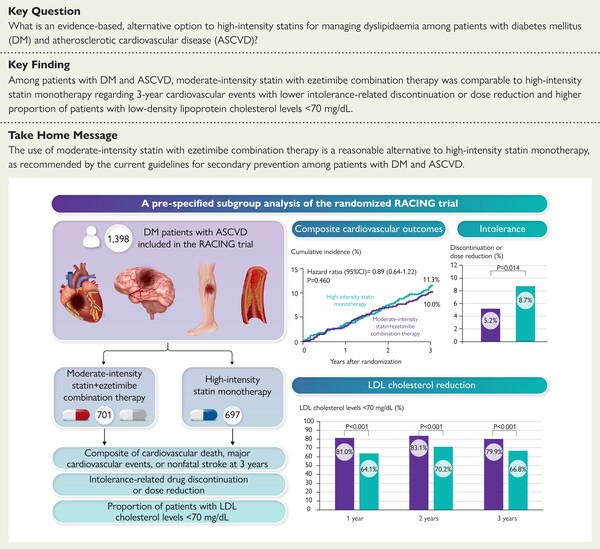Researchers from Severance Hospital and Wonkwang University Hospital (WUH) have confirmed that using moderate statin in combination with ezetimibe was effective to prevent secondary complications in diabetic patients with atherosclerotic cardiovascular disease.

For patients suffering from cardiovascular disease, it is important to keep their low-density lipoprotein (LDL) cholesterol level below 55 mg/dL or 70 mg/dL to prevent the recurrence of myocardial infarction or stroke and death due to cardiac arrest.
To lower LDL cholesterol or so-called “bad cholesterol,” statin therapy inhibiting the synthesis of LDL cholesterol in the liver is most often used. For diabetic patients, LDL cholesterol-lowering therapy using high-intensity statins is crucial.
However, high-intensity statin therapy is difficult to use in the long term in many patients due to side effects such as muscle pain or liver damage.
As a result, doctors suggest combination therapy with non-statin agents such as ezetimibe as an alternative.
Ezetimibe interferes with the absorption of LDL cholesterol in the intestine. So, using ezetimibe with a statin can reduce LDL cholesterol and the dose of statin, which reduces side effects caused by high-dose statin.
The research team of the Department of Cardiology at Severance Hospital had previously proved the superiority of the LDL cholesterol control effect of the moderate statin-ezetimibe combination therapy compared to the high-intensity statin monotherapy through the RACING clinical study, published in the Lancet. However, there has been no clinical follow-up study on the effect of moderate statin and ezetimibe combination therapy in diabetic patients with cardiovascular disease.

Therefore, the team, led by Professors Kim Jung-sun and Lee Yong-joon at Severance Hospital and Yun Kyeong-ho and Cho Jae Young at WUH, conducted a sub-analysis of the diabetes group in the RACING trial.
The RACING trial compared the treatment effects of high-intensity statin monotherapy and moderate-intensity statin and ezetimibe statin and ezetimibe combination therapy.
The trial was conducted at 28 Korean hospitals, where 1,398 cardiovascular disease patients with diabetes were enrolled from February 2017 to December 2018.
In the research, the team randomized the two treatment regimens and followed them for three years to analyze the degree of LDL-cholesterol reduction, cardiovascular death, stroke, and cardiovascular event rates.
As a result of analyzing the degree of LDL cholesterol reduction, the team confirmed that 79.9 percent of the combination therapy group maintained LDL cholesterol levels below 70 mg/dL, which was superior to 66.8 percent of the statin monotherapy group.
In terms of cardiovascular mortality, cardiovascular event rates, and stroke rates during the three-year clinical follow-up, the combination therapy group accounted for 10 percent, which was similar to the monotherapy group (11.3 percent).
Notably, the rate of drug discontinuation or dose reduction due to side effects or intolerance was 5.2 percent in the combination therapy group, which was significantly lower than 8.7 percent in the monotherapy group, confirming better drug compliance.
“In diabetic patients with cardiovascular disease, the moderate statin-ezetimibe combination therapy effectively controlled LDL cholesterol and showed better drug compliance compared to the high-intensity statin monotherapy,” Professor Kim said. “The team expects that the combination therapy will become a new treatment alternative that improves safety without reducing efficacy.”
The study result was published in the latest issue of the European Heart Journal.

